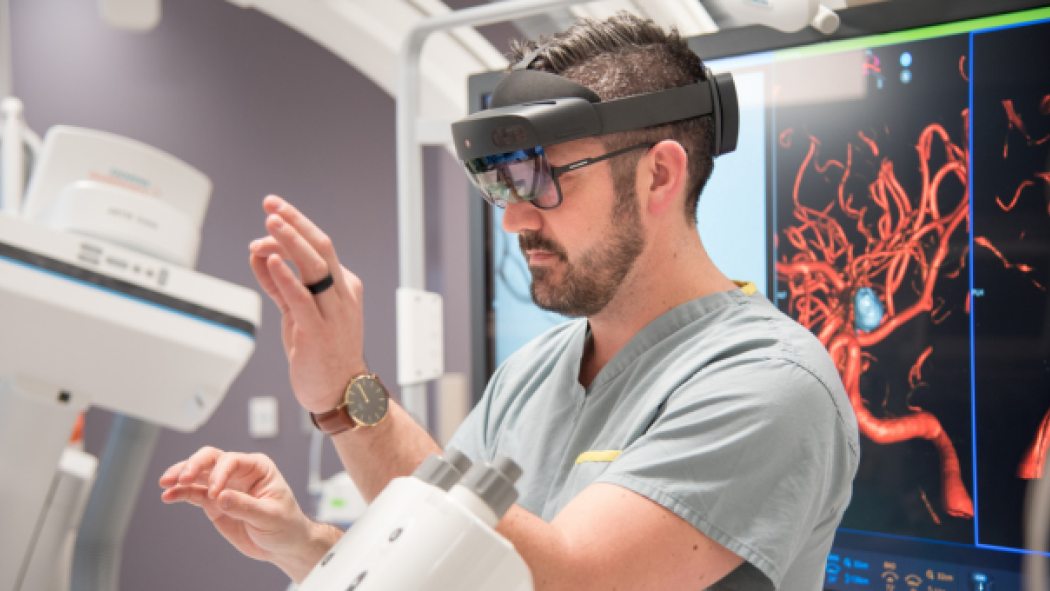
Innovative projects like using mixed reality in the operating room are once again being supported by London Health Sciences Centre (LHSC), London Health Sciences Foundation (LHSF) and Children’s Health Foundation through LHSC’s Academic Realignment Initiative Awards.
A total of 15 research and quality improvement awards are being funded from the 2023 program, totaling $1.7 million over two years. Awardees will help improve patient outcomes by enhancing surgical procedures, optimizing imaging technologies, and elevating treatments for a wide range of conditions.
“The Academic Realignment Initiative Awards reflect LHSC’s strategic commitment to embed research and learning throughout our operations,” said Cheryl Litchfield, Senior Director of Research Operations, LHSC. “Our initial awardees have advanced remarkable work with the support of these awards, and I look forward to seeing the difference that will be made through this further investment in Team LHSC, which has been made possible by our foundation partners.”
The Academic Realignment Initiative Awards were first awarded in 2022, expanding the traditional definition of research by supporting projects from staff and physicians across the organization. One of those staff members was Jonathan Collier, an interventional radiology technologist who saw an opportunity to help LHSC get the most out of technology upgrades being made through a growing partnership with Siemens Healthineers.
Collier was awarded a two-year Clinician-Scientist Award with funding from LHSF. One focus of his research was the use of mixed reality technology in the angiography suites, changing the way radiologists view crucial information during image-guided interventions.
"Jon's work with the HoloLens is a testament to the importance of providing research opportunities for frontline staff,” says John MacFarlane, President and CEO of London Health Sciences Foundation. “By empowering staff with the resources and support they need, we are opening new paths to discovery and innovation. Donor funding plays a central role in this process, leading to enhanced care and outcomes for patients at LHSC.”
Mixed reality technology in the operating room
Interventional radiologists are able to diagnose and treat many conditions, like placing stents to open blocked blood vessels, quicker and more safely than open surgery by using minimally-invasive procedures guided by advanced imaging technology. Typically, these procedures require a stationary 60–inch monitor, which can be restrictive to physicians, nurses and other team members.
Through the research of Collier and Dr. David Hocking, Diagnostic and Interventional Radiologist at LHSC, radiologists at LHSC are now pioneering the use of the Microsoft HoloLens – a mixed reality headset with see-through holographic lenses – to allow its wearer to consult crucial imaging while remaining aware of their physical surroundings and maintaining close connection with the patient.
“As advancements in angiography introduce more images and data for physicians to make informed decisions, large display monitors occupy a considerable amount of the tableside space, which puts a wall between the health care workers and the patients,” explained Collier. “Using mixed reality technology, we’re enabling the health care team to continue to focus on the patient while maintaining access to the most advanced images.”
The team hopes the technology – which is being paired with software developed by a team led by Collier and Dr. Hocking – will allow patients to feel more connected to their health-care providers while also improving patient safety. Studies have shown that physicians needing to turn from the direction they are working in to view a monitor can reduce accuracy. The HoloLens allows the physician to keep the imaging data and patient in the same field of view with the goal of improving patient outcomes.
Collier’s work is just one example of how the Academic Realignment Initiative Awards are impacting patient care at LHSC. Other projects supported through the initial funding include improving the care of women who become pregnant after kidney donation and improving care for children with epilepsy.
“Thanks to the generous support of our community, Children’s Health Foundation is able to fund crucial aspects of this initiative, like its first endowed chair and remarkable advances to care for paediatric epilepsy patients,” says Scott Fortnum, President and CEO of Children’s Health Foundation. “Children’s Health Foundation and our donors are pleased to continue funding the best at Children’s, including leading innovations like the Academic Realignment Initiative Awards.”